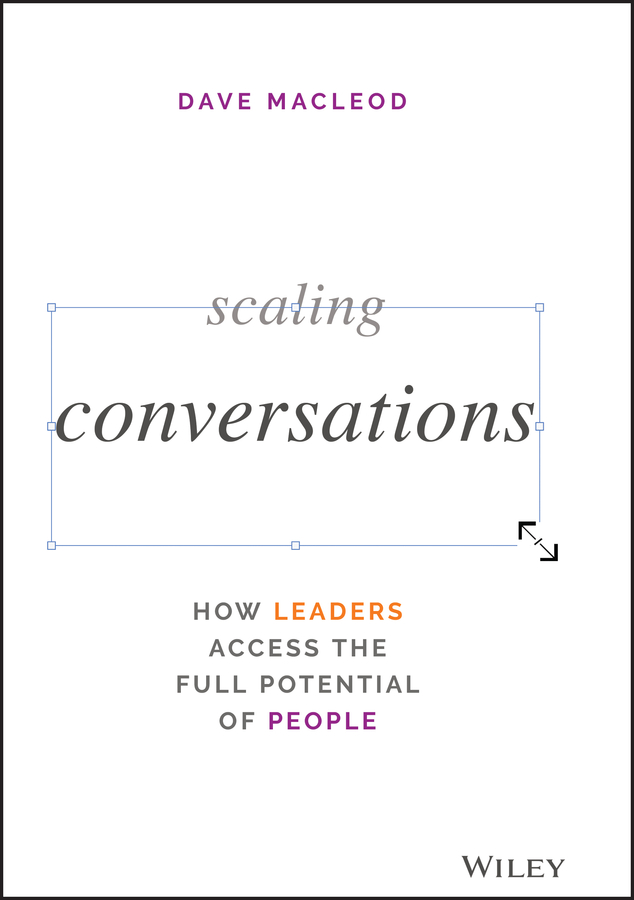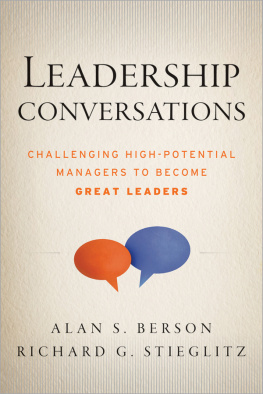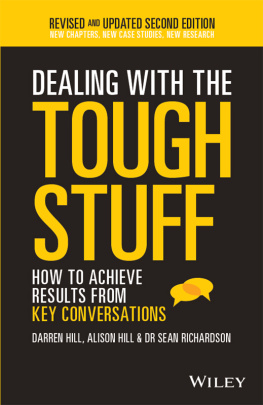
Table of Contents
Guide
Pages
DAVE MACLEOD
Scaling Conversations
HOW LEADERS ACCESS THE FULL POTENTIAL OF PEOPLE

Copyright 2021 by John Wiley & Sons, Inc. All rights reserved.
Published by John Wiley & Sons, Inc., Hoboken, New Jersey.
Published simultaneously in Canada.
No part of this publication may be reproduced, stored in a retrieval system, or transmitted in any form or by any means, electronic, mechanical, photocopying, recording, scanning, or otherwise, except as permitted under Section 107 or 108 of the 1976 United States Copyright Act, without either the prior written permission of the Publisher, or authorization through payment of the appropriate percopy fee to the Copyright Clearance Center, Inc., 222 Rosewood Drive, Danvers, MA 01923, (978) 7508400, fax (978) 6468600, or on the Web at www.copyright.com. Requests to the Publisher for permission should be addressed to the Permissions Department, John Wiley & Sons, Inc., 111 River Street, Hoboken, NJ 07030, (201) 7486011, fax (201) 7486008, or online at http://www.wiley.com/go/permissions.
Limit of Liability/Disclaimer of Warranty: While the publisher and author have used their best efforts in preparing this book, they make no representations or warranties with respect to the accuracy or completeness of the contents of this book and specifically disclaim any implied warranties of merchantability or fitness for a particular purpose. No warranty may be created or extended by sales representatives or written sales materials. The advice and strategies contained herein may not be suitable for your situation. You should consult with a professional where appropriate. Neither the publisher nor author shall be liable for any loss of profit or any other commercial damages, including but not limited to special, incidental, consequential, or other damages.
For general information on our other products and services or for technical support, please contact our Customer Care Department within the United States at (800) 7622974, outside the United States at (317) 5723993 or fax (317) 5724002.
Wiley publishes in a variety of print and electronic formats and by printondemand. Some material included with standard print versions of this book may not be included in ebooks or in printondemand. If this book refers to media such as a CD or DVD that is not included in the version you purchased, you may download this material at http://booksupport.wiley.com. For more information about Wiley products, visit www.wiley.com.
Library of Congress Cataloging-in-Publication Data
Names: Macleod, Dave (Chief executive officers), author.
Title: Scaling conversations : how leaders access the full potential of people / Dave Macleod.
Description: Hoboken, New Jersey : Wiley, [2021] | Includes index.
Identifiers: LCCN 2021008933 (print) | LCCN 2021008934 (ebook) | ISBN 9781119764458 (hardback) | ISBN 9781119764519 (adobe pdf) | ISBN 9781119764502 (epub)
Subjects: LCSH: Business communication. | Conversation.
Classification: LCC HF5718 .M3175 2021 (print) | LCC HF5718 (ebook) | DDC 658.4/5--dc23
LC record available at https://lccn.loc.gov/2021008933
LC ebook record available at https://lccn.loc.gov/2021008934
Cover Art and Design: Paul McCarthy
For and because of my amazing boys Aaron, Liam, and Fynn
THE LIMIT OF OUR COMPETITIVE ADVANTAGE
We humans are uniquely wired for empathy, facial recognition, and language. Our ability to collaborate with one another, beyond our relative groups, is widely recognized as the key ingredient of what has driven so much of our amazing progress as a species. Long ago humans were, fortunately, able to recognize the mutual benefit of our interdependence. Rather than just brutally compete with each other at all times, we took an interest in the wellbeing of others to improve our own lives. Initially we applied this to feeding ourselves and to simple ways of interacting beyond our family members. Over time, we developed deeper and deeper ways of collaborating more effectively. Again, for our own gain.
As our societies developed, we were pretty successful at collaboration: We embraced our ability to empathize and consider the points of view of others; we leveraged our ability to recognize each other and remember who we had made agreements with; and we refined our language to improve how we created things that mutually benefitted all of us. Soon enough we spread to all corners of the planet and created a global ability to share our feelings and opinions, watch sports and buy things from one another, using screens in our pockets. The language and technology we use to better cooperate with one another continues to evolve to this day as we all keep working to solve problems that threaten our species in small and large ways.
It would be great if we could simply spend a lot of time discovering and celebrating our incredible ability to work together as a species, but unfortunately, and obviously, we have used those same abilities to divide and polarize.
Along with our favorable wiring, as a species we are also wired in extremely unhelpful ways. Often described as two different kinds of brain, along with our ability to learn and be creative, we have parallel survival instincts that hijack our capacity to empathize and communicate effectively. When we perceive a threat, humans react similarly to many other animal groups: We respond by fighting, fleeing or freezing. This happens in both well and lessunderstood ways.
On the wellunderstood side, sometimes relatively simple threats can cause two perfectly reasonable adults to be suddenly angry and unable to inhabit the same room. Sometimes, reading an email or social post that seems threatening can destroy an entire relationship. Different views on religion, philosophy and politics can make people so divided they can't even hear one another, never mind collaborate. You can easily think of hundreds of human behaviors that decrease our ability to work well together.
On the lessunderstood side, unconscious biases can cause people to misinterpret and react poorly to one another based on things they don't clearly realize. Extroverts and introverts require different environments to allow effective communication. Systemic racism has created mechanisms to ensure privileged people have more ability to influence than people with a different skin color. Social media is built to silo people and amplify extreme voices in an echo chamber.
For nearly every communication ability we can point to, as a species, we can also single out a failure to communicate that threatens our organizations, our society and, ultimately, our world. The remedy for this is to continue to improve our ability to share our voice, listen to one another, and discover common ground and insight to our mutual benefit. Simply, we need to converse better.
Over the years, humans have innovated to overcome our unfavorable wiring and our inability to converse in large groups. To try to ensure we get as much benefit as possible from group conversations we have invented talking sticks, council etiquette, and, in more recent times, Robert's Rules of Orderan adaptation of the rules and practice of Congress to address the needs of nonlegislative societies published by US Army Officer Henry Martyn Robert in 1876. Many organizations train people in collaborative negotiation, conflict resolution and group meeting facilitation. Recognizing our inability to converse effectively in large groups, leaders in all sectors of society try to add structures to get the best out of groups and avoid the worst behaviors and outcomes.
Next page








